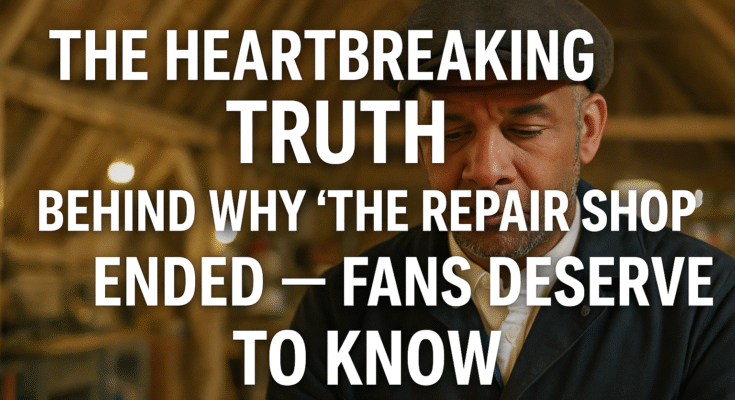“The Repair Shop,” that gentle sanctuary on our screens, was beloved for its heartwarming premise: broken heirlooms lovingly restored, and with them, the precious memories they held. It offered a rare glimpse into genuine human connection, set against the backdrop of a peaceful Sussex barn. But beneath the surface of soothing voices and masterful craftsmanship lay a story of hidden trauma and gradual unraveling, a narrative that would ultimately alter the show’s very essence.
At the heart of this untold story is Suzie Fletcher, the show’s esteemed leather expert. While her warmth and care were evident to all, her personal life remained a private realm. It wasn’t until 2023 that Suzie courageously shared her truth: years spent enduring silent, intimate abuse in her marriage. Her husband’s unhealed childhood trauma manifested as emotional volatility and physical violence, leaving Suzie in a constant state of psychological survival. His death in 2013 brought a complex mix of grief, release, and guilt.
When Suzie joined “The Repair Shop,” this deep trauma was not healed but carefully compartmentalized. The barn, with its focus on mending and restoration, became a form of therapy for her. The rhythmic nature of her work provided an emotional lifeline. However, the very atmosphere of the show, steeped in the emotional stories of its guests, also meant Suzie was constantly absorbing the grief and loss of others, all while carrying her own unspoken pain. She became the quiet anchor, offering support without ever revealing her own struggles.
The emotional labor, especially the invisible kind, began to take its toll. While Suzie mended objects on camera, off-camera, a slow realization dawned: it was time to start mending herself. In 2023, she released her memoir, “The Sun Over the Mountain,” a courageous act of reclaiming her narrative. In it, she detailed the fear and dread of her past, including a harrowing incident where she feared for her life. This revelation shocked many fans, who had only seen her calm and gentle demeanor. Writing the book was a cathartic process, a way of stitching herself back together with truth.
Suzie’s honesty had a ripple effect. It recast every past episode in a new light, deepening the audience’s understanding of her quiet strength and empathy. However, it also subtly shifted the delicate emotional ecosystem of the barn. The show, which thrived on hope and restoration, was now also a place where immense personal suffering had been silently carried.
Then came another disruption: the controversy surrounding Jay Blades, the show’s host. Allegations and charges led to his swift removal from episodes and a dip in public trust. For a show built on sincerity and emotional openness, this scandal was destabilizing, especially for someone like Suzie, who was already navigating fragile emotional ground.
Slowly, almost imperceptibly, “The Repair Shop” began to change. Tour dates were postponed, and fans noticed the absence of familiar faces, particularly Suzie Fletcher. It wasn’t a dramatic public exit, but her quiet departure spoke volumes. Without its emotional core, the barn felt different. The vibrant energy and deep connection that had defined the show began to fade.
While the BBC attempted to maintain the illusion, the show felt like a reenactment of its former self. The format remained, but the authentic emotional pulse was fainter. Suzie’s memoir, in a way, provided the closure the show never formally offered. It highlighted that the emotional depth of “The Repair Shop” was real, rooted in the genuine experiences of those within its walls.
Technically, “The Repair Shop” continues. However, what remains is a version of the show, a familiar shell missing the invisible thread that once held it all together. It wasn’t a single scandal or a ratings drop that marked its decline, but a tragic secret carried in silence, the immense emotional weight borne by its healers, and the quiet departures of those who gave it heart.
“The Repair Shop” was always more than just about fixing objects; it was about resilience, grace, and the possibility of becoming whole again. But resilience has its limits. The story of “The Repair Shop” and Suzie Fletcher is a poignant reminder that even in spaces dedicated to healing, the healers themselves can be quietly breaking. And sometimes, the most profound act of restoration is knowing when it’s time to let go.



